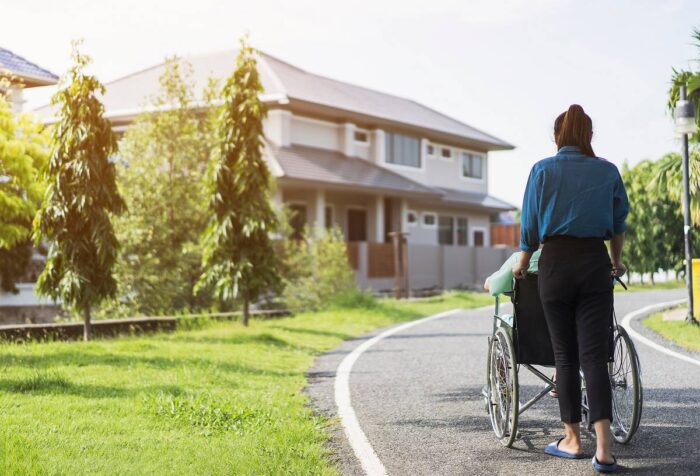Aging in one's own home or apartment is a preference of older people, and most can do so. The physical features of a home should accommodate seniors' physical and mental needs, be affordable, and have easy access to needed services and activities.
A housing grant provides a means of securing the funds necessary to obtain housing for low-income families — especially senior citizens. Whether you are purchasing a home, renting property for income, renovating existing properties, or in danger of losing your home due to foreclosure, this assistance can help. Federal funding comes primarily from the U.S. Department of Housing and Urban Development (HUD) and other traditional lenders through grant programs funded by the federal government.
Low Income For Seniors Citizens’ Apartments And Housing Programs

United States households earn an average income of $53,000 per year. You must have an income below 50% of that amount in order to qualify for low income for seniors citizens’ apartments. The rent assistance program can pay for up to 30% of the cost of seniors' housing, and the rest is paid by the federal government.
Various programs offer free or low-cost housing options to seniors with little to no means of income. The following are some of the best options seniors can avail to keep a roof over their heads:
Section 504 Home Repair Program
This program provides loans to very low-income homeowners to repair, improve, or modernize their homes or to remove health and safety hazards from their homes. You must meet the following requirements to qualify for the Section 504 program:
- Be the owner and occupant of the property
- Have difficulty obtaining credit elsewhere
- Income limits vary by county but should not exceed the very low limit
- Must be 62 years of age or older and unable to repay a loan for repairs
$10,000 in grants and $40,000 in loans are the maximum amounts. A maximum of $50,000 can be obtained through a combination of loans and grants.
A 1% interest rate is fixed on the loans for 20 years. A Section 504 loan with an outstanding balance of over $25,000 requires full title service. In the event that the property is sold within three years, the grant must be repaid. Applicants may be offered a loan and grant combination if they are able to repay part of the costs but not all.
Section 202 Direct Loans Program
The Senior Citizen Home Ownership Opportunity Program, also known as Section 202 Direct Loans Program, provides loans for elderly and low-income households. You may be eligible for a down payment and closing cost assistance if you meet all other program requirements.
Low-income households must have at least one member aged 62 or older at the time of application and occupancy. Rent assistance funds from HUD projects can cover the difference between landlord and tenant contributions. Many sources of income fall under this category, including pensions, retirement plans, and even SSI benefits.
Residents of a home, apartment, or retirement community living under Section 202 usually contribute up to 30% of their income toward housing costs. Subsidies and grants provided by the federal government will cover about half the fair market value of the unit.
Section 811 Program
With Section 811, persons with disabilities can live independently in the community by subsidizing rental housing opportunities and providing appropriate support services. The program offers interest-free capital advances and operating subsidies to nonprofit developers of wheelchair-accessible housing, as well as rent assistance to state housing agencies.
Families with at least one adult member with a disability (a physical or developmental disability, chronic mental illness), including those who receive capital advances and are supported by project rental assistance contracts (PRACs), should be extremely low-income (within 50% of the area's median income).
Residents must have at least one adult member with a disability for projects funded by Project Rental Assistance. In addition, they must have extremely low incomes (below 30% of the area's median income). A Notice of Funding Availability (NOFA) is published in the Federal Register every year and listed on Grants’ website. Applicants must respond to the NOFA by submitting an application.
Section 202 Supportive Housing For The Elderly Program
Supportive housing programs, funded by HUD, are also available to seniors aged 62 and older who meet the “very low income” criteria. Seniors are the only group eligible for government subsidies, and it's the only program that offers affordable housing exclusively for them.
It is estimated that more than a quarter million senior living units are funded through Section 202 at present. There is a lot of similarity between Section 202 and Section 8 in terms of their structure. The HUD subsidy makes up the difference between 30% and 60% of the participant's income.
Section 8 Housing Choice Voucher Program
Low-income residents may rent a "safe and reasonable" apartment or other accommodation through Section 8 housing. Designed by the HUD, the Housing Choice Voucher Program offers vouchers to low-income families. Rental housing is made affordable for low-income families, seniors, and people with disabilities.
You will be considered eligible for the program by your local public housing agency (PHA) based on these factors:
- Income earned each year
- Whether a family, senior, or disabled individual
- Citizenship of the United States or eligibility for immigration
- Number of people in your family
- Additional local factors
Housing eligibility rules may vary by state or city. To learn if you're eligible for a Housing Choice voucher, contact your local PHA. Rent is paid by 30% of an individual's or family's income under Section 8. Additionally, applicants must not earn more than 50% of the local median income. Contact your local PHA for information about housing programs or apply for a Housing Choice Voucher. In case you need more assistance, you can reach out to your local HUD office.
Low Income Housing Tax Credit (LIHTC)
This federally-funded program focuses not just on senior housing but on providing enough low-income housing to meet population demands. Since 1995, HUD has made 105,000 LIHTC units available per year, according to its statistics.
Low-income residents are assigned to a certain number of units by the building owner. For owners to qualify for tax credits, they must accept the rent amount specified by HUD. Those who meet the income requirements can find HUD-approved housing in their local area that qualifies for the housing tax credit.
Public Housing
Rental houses or apartments owned by the government are known as public housing. People with disabilities, low-income families, and seniors are eligible to benefit from this initiative. Single-family homes and high-rise apartments make up public housing throughout the nation, and the HUD handles the administration of the program.
You will be assessed for public housing by your local PHA based on your annual gross income, your citizenship or immigration status, and other factors. You must make at least 80% of the median income in the county or metropolitan area where you would like to live and at least 50% of the median income for the very low-income limit.
Some states, cities, and counties have different income limits and eligibility requirements, so you may not be eligible in another. Get in touch with your local PHA if you wish to apply. Fill out your written application either by yourself or by a PHA representative.
Section 515 Rural Rental Housing Program
Low-income rural residents can build, acquire, or renovate homes through USDA's Section 515 program. It allows seniors to live with dignity and thrive in rural areas, where more than 15,000 apartments are available.
Through the Rural Rental Housing Program, the U.S. Department of Agriculture directly assists thousands of low-income families with their rental needs every month.
Frequently Asked Questions:
Free housing and apartment grants for low-income senior citizens include the Section 202 Supportive Housing for the Elderly Program, the Housing Choice Voucher Program (Section 8), and Low-Income Housing Tax Credit (LIHTC) properties. These programs provide affordable housing options and rental assistance to help seniors maintain their independence and secure safe, suitable housing.
To apply for the Section 202 Supportive Housing for the Elderly Program or the Housing Choice Voucher Program (Section 8), low-income senior citizens should contact their local Public Housing Agency (PHA) or the U.S. Department of Housing and Urban Development (HUD) office. These agencies can provide information on eligibility requirements, application procedures, and waiting lists.
Low-income senior citizens can find LIHTC properties or other affordable housing options by using resources like the HUD's affordable apartment search tool, contacting local housing authorities, or reaching out to nonprofit organizations that specialize in senior housing assistance. Additionally, Area Agencies on Aging (AAA) can provide guidance and resources for senior housing options and support services in their region.
Key programs include Section 202 Supportive Housing for the Elderly Program, HUD Public Housing Program, and Rural Housing Repair and Rehabilitation Grants.
Generally, individuals must be 62 years or older and meet specific income guidelines, which vary by program.
The Bottom Line
Federal home grants are not for everyone — but you'll never know if you qualify unless you try. Some agencies will assist you in finding a grant that suits your needs, and they will guide and help you apply for it so your chances of success are maximized.
If you need an air conditioner but can't afford one, check out our article about free air conditioners for seniors.
To learn more about grants and programs that can help you with your living situation, read Gov Relations’ article on how you can get government hardship grants.







